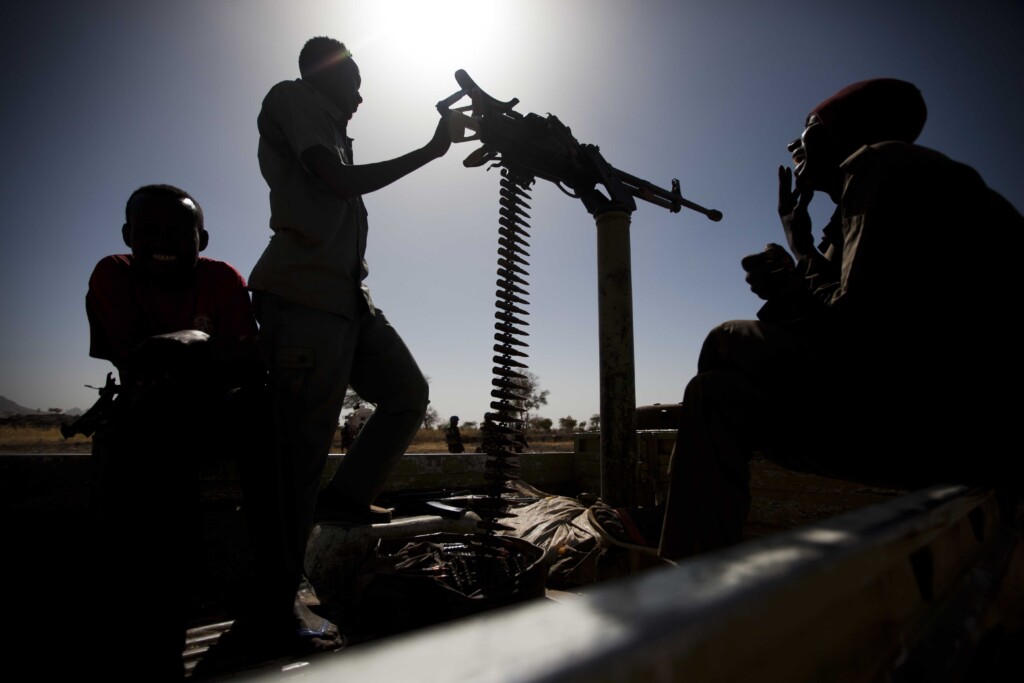Sudan war: SAF-RSF Jebel Aulia clashes intensify, North Darfur dengue fever and malaria cases surge

Combatants in Sudan on a vehicle mounted with a 'dushka' .50-cal machinegun (File photo: Albert Gonzalez Farran / UNAMID)
In a series of developments that unfolded over the past four days, warplanes executed airstrikes on specific sites within Jebel Aulia, situated at the southernmost edge of Khartoum. Intense clashes continued to rage throughout yesterday, marking the fourth consecutive day conflict in the area. The North Darfur Health Ministry also cautioned of a surging epidemic threat yesterday, following heavy fighting in the state capital of El Fasher last week, which claimed five lives and left many injured and displaced.
Social media activists launched the hashtag #JebelAuliaMassacre (مجزرة_جبل_اولياء# in Arabic), accusing the Rapid Support Forces (RSF) of killing and detaining a significant number of civilians. The hashtag is also serving as a platform to share images of missing people, seeking information on their whereabouts, and to pay tributes to those who were killed.
The Jebel Aulia Emergency Room shared a list of 12 detainees released by the RSF yesterday. Today, the Emergency Room posted an updated list of 58 missing persons, which they said will be “continually updated as more information becomes available”.
In response to the RSF advance, armed groups blocked a road leading to Jebel Aulia, protesting the killing of their tribe members and the group’s presence in the area. Footage shared on X (formerly Twitter) appears to show armed men, identifying themselves as members of the El Jomouiya tribe, warning that “any RSF soldier attempting to cross this road will be buried here”. The caption specifies the location as “the western road to southern Omdurman”.
Residents from various neighbourhoods in Jebel Aulia continued to flee to White Nile state and nearby areas. Both the Sudan Armed Forces (SAF) and the RSF affirmed their control of El Najumi airbase through videos on their respective media platforms.
On the ground, sources reported that the RSF has partial control of El Najumi base but has not yet secured the Jebel Aulia dam, a strategic target. Control of the dam would enable the paramilitary group to link its forces on the eastern and western sides of the Nile.
Listeners in Jebel Aulia told Radio Dabanga that the RSF has taken control of several villages, including El Sheikh El Yagout and Wad Jar El Nabi, south of Jebel Aulia.
In Khartoum North’s (Khartoum Bahri) Haj Yousef, residents complained of a worsening security situation, citing a rise in house robberies and theft incidents.
A listener in Haj Yousef told Radio Dabanga that the availability of bread in the area is scarce, leading to long queues at operational bakeries. Shops in Haj Yousef are on the verge of running out of basic goods, which was attributed to the absence of new supplies from El Gezira. He further noted that the Rapid Support Forces (RSF), which previously supplied rice and lentils in the area, have ceased these distributions.
The area is currently free from clashes, with a steady supply of water and electricity, he added.
North Darfur
The Ministry of Health in North Darfur reported that five people were killed, and 22 injured, in the latest wave of SAF-RSF clashes in El Fasher, the state capital, last week. The total number of casualties in the state stands at 1,061, including 130 deaths, according to a statement shared yesterday.
During a meeting convened at the Southern Hospital in El Fasher on Wednesday, the North Darfur Emergency Room of Health and Epidemic Control highlighted a concerning surge in malaria and dengue fever cases in the state. The total suspected cases of dengue fever reached 7,075, including 488 confirmed cases, with a positivity rate of 76.7%.
The North Darfur Emergency Room warned of the potential spread of cholera, already affecting six states, and raised alarms about maternal deaths in Dar El Salam locality.
Most health facilities in El Fasher North are non-operational, “with the exception of the El Nasr and El Gubba centres”. El Fasher is grappling with a large influx of people fleeing El Fasher North to the relatively safer southern neighbourhoods, and overcrowding “in areas already lacking health services”. The report also pointed at the scarcity of medicines and medical supplies, and the departure of medical staff.








 and then
and then